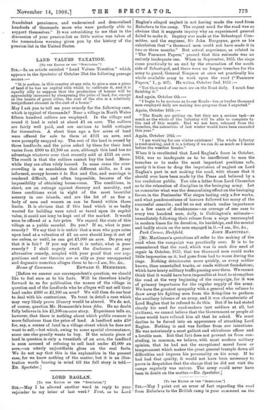LAND VALUES TAXATION.
[To THE EDITOR OP TIM SPRCTATOR."1 SIR,—In an article entitled " Land Values Taxation " which appears in the Spectator of October 31st the following passage
occurs :—
"It is useless, in this country at any rate, to give a man a piece of land if he has no capital with which to cultivate it, and it is equally silly to suppose that the production of houses will be appreciably increased by cheapening the price of laud, for, except in the hearts of great cities, the cost of the site is a relatively insignificant element in the cost of a house."
May I ask you to tell me your remedy for the following case, which is typical of thousands? Near a village in North Wales
fifteen hundred colliers are employed. In the village and round it land is rated at about £1 an acre. The colliers are fairly well paid, and are anxious to build cottages for themselves. A short time ago a few acres of laud were offered for sale to them at £121 an acre, and were promptly snapped up. The rest of the land is owned by three landlords, and the price asked by them for their land varies from £800 to £1,100 an acre, although this land has no advantage whatever over that recently sold at £121 an acre.
The result is that the colliers cannot buy the laud. Mean- while they are often vilely housed. In some cases the over- crowding is so scandalous that different shifts, so I am informed, occupy houses a la Box and Cox, and marriage is rendered difficult, and often impossible, because of the impossibility of obtaining house-room. The conditions, in short, are an outrage against decency and morality, and these conditions exist in sight of the most beautiful scenery in our islands, and are the lot of as fine a body of men and women as can be found within those limits. It is obvious that if this land which is so badly wanted for building were rated or taxed upon its capital value, it could not long be kept out of the market. It would soon be offered at a fair price. We regard the state of this village as a public scandal. Do you ? If so, what is your remedy ? We say that it is unfair that a man who pays rates upon land at a valuation of £1 an acre should keep it out of use unless, or until, he can get £1,000 an acre. Do you say that it is fair ? If you say that it is unfair, what is your remedy ? I shall eagerly await the disclosure of your alternative remedy, coupled with your proof that our sup- positions and our theories are as silly as your unsupported and dogmatic assertion alleges them to be.—I am, Sir, &c., [Before we answer our correspondent's question, we should like to feel sure as to his facts. Will he therefore kindly forward to us for publication the names of the village in question and of the landlords who he alleges will not sell their land under £800 or £1,100 an acre ? We will then do our best to deal with his contentions. To treat in detail a case which may very likely prove illusory would be absurd. We do not, of course, question Mr. Hemmerde's bona fides. He no doubt fully believes in his £1,100-an-acre story. Experience tells us, however, that there is nothing about which public rumour is more fallacious than the price of land. A landlord asks £50 for, say, a corner of land in a village street which he does not want to sell,—but which, owing to some special circumstance, some one else greatly wants to buy. If the minute piece of land in question is only a twentieth of an acre, the landlord is soon accused of refusing to sell land under £1,000 an acre,—an utterly unjustifiable gloss on the real facts.
We do not say that this is the explanation in the present case, for we know nothing of the matter, but it is an illus- tration worth bearing in mind till the full story is told.— ED. Spectator.]










































 Previous page
Previous page